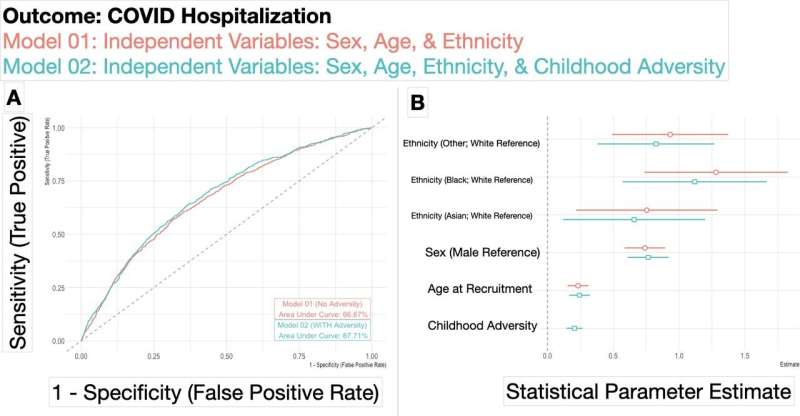This article has been reviewed according to Science X's editorial process and policies. Editors have highlighted the following attributes while ensuring the content's credibility:
fact-checked
peer-reviewed publication
trusted source
proofread
Study links childhood trauma to COVID-19 deaths, hospitalizations

People who endured childhood adversity, like abuse or neglect, were more likely to be hospitalized or die from COVID-19 in adulthood, a new University of Pittsburgh study found. Specifically, higher self-reported childhood adversity was linked to 12–25% higher odds of COVID-19 hospitalization and mortality.
While age, sex, ethnicity, health, and sociodemographic factors have been related to such outcomes throughout the pandemic, this was the first study finding a link between these COVID-19 outcomes and childhood neglect and abuse.
Using the UK Biobank in Great Britain, a team—lead by Jamie L. Hanson, a researcher in Pitt's Learning Research & Development Center and an assistant professor in psychology in the Kenneth P. Dietrich School of Arts & Sciences—took a deep dive into information provided by more than 151,200 adults of middle age or older. What the numbers showed was that people who reported "adversity" such as abuse or neglect while children were more likely to die or be hospitalized from COVID-19.
The study was published in the Journal of Epidemiology and Community Health.
"These findings highlight how trauma early in life can have long-lasting impacts on health decades later," Hanson said. "We know that COVID-19 is related to excessive hospitalization and death in the UK and in the United States. And there's emerging research finding that facing adversity, abuse or neglect, early in life, could have sizeable effects on physical health."
"But no one had tried to connect these two trends. Knowing a bit more about someone's early development could be important to help reduce disparities in COVID-19."
While Hanson and his co-authors maintain that their work opens the door for more pinpointed and global studies, they believe their findings show there could be a need for policies and interventions to lessen COVID-19 impacts in people who have suffered from such childhood adversity.
"We may need targeted interventions for individuals and certain communities affected by childhood adversity to lessen the pandemic's lasting impact," Hanson said. "Adversity may lead to risk for negative outcomes and the potential to have long-COVID. We need to complete more work to understand how adversity gets 'under the skin' and increases vulnerability to poor health after COVID-19 infections."
In other words, as the co-authors wrote, not just COVID-19 but such findings could be used "to limit adversity-related negative outcomes with future pandemics."
More information: Jamie L Hanson et al, Childhood adversity and COVID-19 outcomes in the UK Biobank, Journal of Epidemiology and Community Health (2023). DOI: 10.1136/jech-2023-221147





















